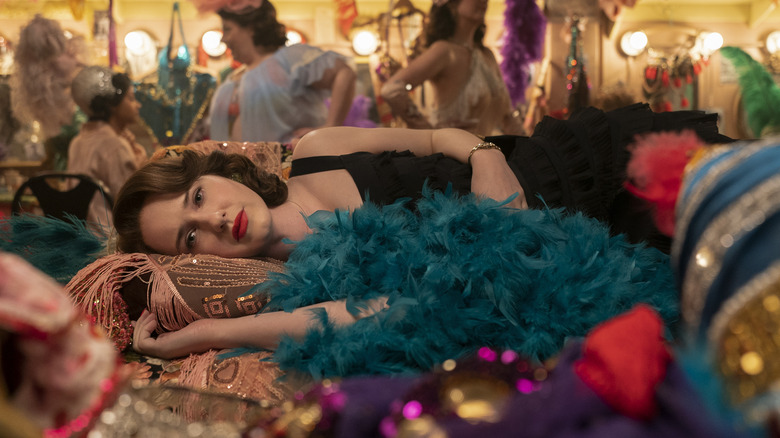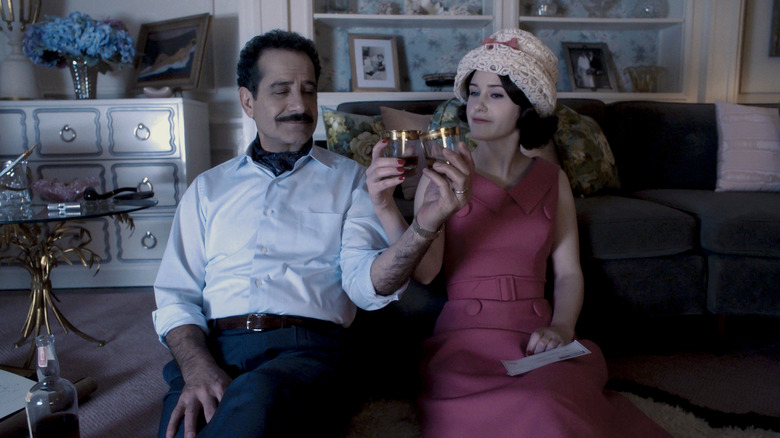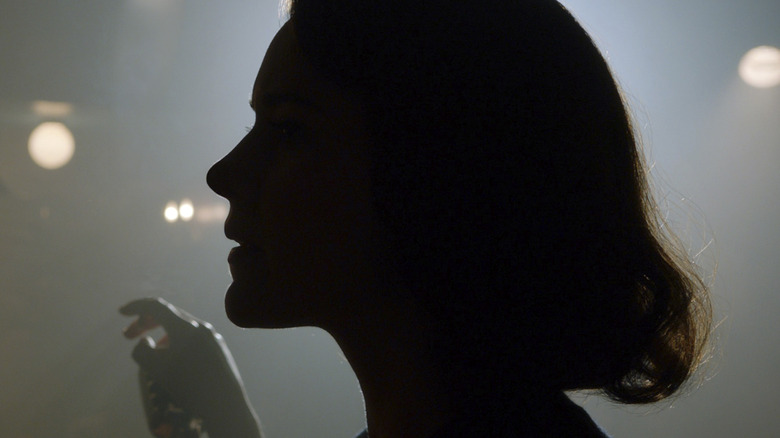The Marvelous Mrs. Maisel Season 4 Review: It's Finally Time To Unravel Midge's Flaws
Midge Maisel is a winner. She's a magnetic motormouth with endless charm and a direct line to even the most cynical funny bones. As the series title indicates, she's gifted with the undeniable ability to leave both friends and strangers stunned, with nothing to do but marvel at the sheer force of her. It only takes a few moments of her dazzle to realize why Joel (Michael Zegen) first fell in love with her, why Susie (Alex Borstein) took a special interest in her talents, and why even one of the world's most beloved comedians Lenny Bruce (Luke Kirby) can't seem to keep away. And therein lies the problem of "The Marvelous Mrs. Maisel." The show's greatest asset has too often doubled as a notable flaw: Midge (Rachel Brosnahan) is destined for greatness and no matter how enormous the obstacle, there's little doubt that she'll quickly surmount it.
The threat of her perfection dawned on the series as early as the second season, and the show responded by playing at failure — turns out Midge can bomb on stage! She can even make an enemy of her audience. But even then, her magnetism has a way of winning out. She may plummet, but one more spotlight is all it takes to revitalize her potential. While the third season of "The Marvelous Mrs. Maisel" relished in her success, sending her on tour with the singing sensation Shy Baldwin (Leroy McClain), the fourth sends her tumbling back down. This time, Midge has been knocked off balance in a way that's reminiscent of her initial introduction. In her own words, "Once again a man has stepped in and f***ed up my life."
Last time around, that man was Joel, her disillusioned husband so overcome by his personal disappointment and failures that he opted to leave his wife behind for his secretary. Though the loss hurt, it became the spark that ignited a fire in Mrs. Maisel. Midge didn't just transform, she bloomed into a goddamn star. So when we yet again find her mourning a life stolen by man's decision, it's fair to assume that another spark is on the horizon, ready to launch her closer to her bedazzled destiny. But there's one big difference: Joel left because he was an immature idiot. Shy Baldwin fired Midge for her insensitivity.
At their Apollo kickoff performance in the season 3 finale, her jokes genuinely threatened him. It wasn't merely a matter of wounded pride; Midge was playing with fire by poking fun at Shy's sexuality, risking his career by edging on overt and betraying his friendship by making light of his fears. Midge isn't golden this time. She isn't just a woman scorned. She messed up, and the time has come to reckon with her mistakes. But in the world of Midge Maisel, such things don't happen — she is a victim or she is a hero, but she certainly can't be at fault. So what happens when Midge's version of the world doesn't match up with the reality of her story? Well, just like that, "The Marvelous Mrs. Maisel" has a chance to finally overcome its biggest hindrance.
Upending the status quo
The fourth season gets off to a slow start as we accept our new status quo: this marks the next big moment in many lives, some much more positive than others. While Midge mourns the loss of the international tour meant to be her big break, Susie wonders what she can possibly do next. By the end of the season premiere, Midge makes the kind of grand declaration bound to make any manager quake in their boots: from now on, she wants to get up on stage and say whatever she wants. Every. Single. Time. This, she reasons, is what she was destined to do. No more opening acts and no more "safe" jokes. But this misguided response fails to take into account what actually went down that fateful night at the Apollo. Perhaps it was wrong of Shy to fire her without discussion, or for Reggie (Sterling K. Brown) to offer such vague advice, but what of Midge's words? But any fault on her part is unspeakable of course: our comic lead quickly fingers Shy and his creative teams as the villains of the story. And as she mourns — alternating between sobbing in her curlers and lashing out at an innocent cab driver — we see Midge channel sorrow into anger. Ah yes, the Midge Maisel specialty.
Her bitterness, though hilarious as ever, spells trouble. This is a Midge willing to curse at the milkman; to look at her toddler, and bitterly declare, "It's a f***ing man's world, sweetie." And this complication is very much welcome. When Midge is thrown, she soars — her act is at its best when it comes from an emotional place. "I want my f***ing pound of flesh," she tells the Gaslight audience in one scene, her gravitas dazzling. And if that sounds a little familiar, it's because season 4 purposely mirrors the first. In fact, the first two episodes of season 4 seem to bring Midge full circle — or better yet, they bring her back to the original rock bottom. She finds herself back in curlers at the Gaslight, hiding out from life, family, and the fate of her career. She even makes a crack that it's only a matter of time before she remarries Joel (as if she hasn't already). The more things change, the more they stay the same — save for a few key differences.
The trust between Midge and Susie has never felt more fragile. Midge never doubts her manager for a second, but Susie doubts herself and we can understand why — her gambling issues are catching up with her and even insurance fraud won't be enough to wipe the slate clean. Elsewhere, Tony Shalhoub continues to steal the show, no longer a Columbia professor but instead typing away as a writer for the Village Voice which (surprise, surprise) isn't quite an Ivy league college, in ways both good and bad. All of this bubbles right back down to Midge, who navigates rocky waters as the main provider for both her kids and parents, grapples with anger running her ragged, isn't sure where to direct her need for vengeance, and frankly, seems to be in the midst of an identity crisis. And it's all so tantalizing, so brimming with potential. Upending the status quo is one thing — the show has done it more than once before. Welcoming evolution is something entirely new.
As usual, the gloss of "Mrs. Maisel" persists: the costumes pop, the music choices are pitch-perfect, Rachel Brosnahan makes Midge's success look easy with Amy Sherman-Palladino's sharp dialogue. Joel is up to his usual tricks (starting a new chapter of his life while trying not to be in love with his ex-wife), the Maisel clan are doing as they do best (yelling at the top of their lungs), and the Weissmans battle varying degrees of exasperation. All the while, everything is charming and funny. And of course, I'm perfectly happy to accept a world where Mrs. Maisel is fluffy, hilarious comfort food and nothing more, but the show has made the mistake of proving that it can be so much more. And the table is set for the fourth season to finally follow through.
Midge's potential for greatness
At long last, we're on the verge of delving into the darkness that this series so often glides past without second thought. "The Marvelous Mrs. Maisel" doesn't have to be anything more than it always has been — the trials and tribulations of a 1960s Jewish housewife turned comedian with a sharp tongue and stunning sense of fashion. But! "Maisel" has proven itself capable of doing this in much more interesting ways than it has before. Think back to the first season, so rooted in Midge's emotional journey that comedy became an outlet, a passion, an undeniable ache growing within her. Charm and wit go a long way, but her best moments on stage were magnetic because of her raw anger.
Great comedy, it's often said, is inextricably tied to darkness. We see this in Lenny Bruce, who wanders the series like a spirit guide — her personal friendly ghost, battling demons even he can't quite put his finger on. Late in the season premiere, Midge insists that she's at her best when unrestrained and free to speak her mind — but I think it's when she's furious. Otherwise, her standup rarely goes beyond recounting everyday annoyances, the frustrations of her failed marriage, the insanity of her parents, and the stress of her children. She pushes boundaries with foul language and sexy punchlines but rarely does so from an emotional standpoint. But last season, her father offered a key piece of advice: "If you're going to have a voice, you better be careful what that voice says."
So this is it — this is the show's opportunity to start pushing boundaries. Midge seems to take her father's words to heart, which presents lots of potential for her jaded era. We've seen the vengeful side of Midge before — against her flawed ex-husband Joel, the infamous husband-stealing secretary Penny Pan, and the ever-irritating Sophie Lennon (Jane Lynch). These people earned her venomous words, but Shy's not that simple. Midge's inability to see that is no doubt a flaw, and one the show should spend time with. Her anger will make her comedy soar, and being wrong will push her to grow.
"The Marvelous Mrs. Maisel" often coasts on wit and warmth, bouncing away from the realities of 1960's New York. That seriousness simply isn't the vibe of the show, and that's mostly been fine. But now it's pressing so close to those walls that it would be a thrill to see them break down. How can Midge — who, despite money problems, is back in her Upper West Side apartment with all the usual bells and whistles — coexist in a world with Shy Baldwin, a closeted Black singer surviving fame in American's '60s? How can she blame him for her mistakes and simply go unchecked? Ultimately, "The Marvelous Mrs. Maisel" could reach new heights this season, or it could endlessly retread old steps. I suppose, either way, we'll have more than enough jokes to laugh at and plenty of sheen to gloss over the flaws, but this marks the difference between four weeks of laughter and a fourth season that breathes new life into the series.
Season 4 of "The Marvelous Mrs. Maisel" premieres February 18, 2022, with two new episodes arriving weekly to Prime Video.


